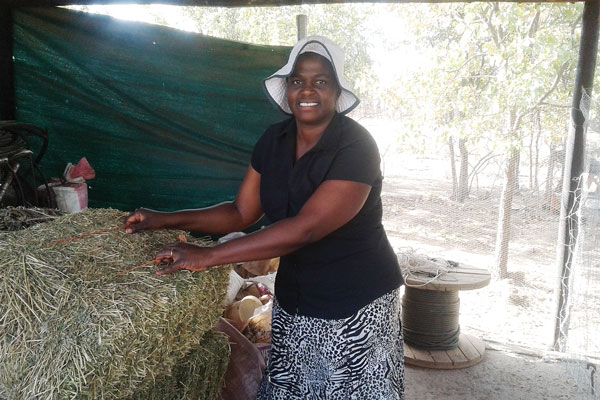
BEITBRIDGE’s relentless sun is well-known, so is the government’s lack of attention to its workers.
BY OWN CORRESPONDENT

Civil servants’ salaries are low and the pay days are unpredictable.
When the workers are finally paid, accessing the money is a tall order, with long winding queues at every bank.
However, the government never misses an opportunity for new cars for its numerous Cabinet ministers and their deputies at a time ordinary civil servants are made to work without the basic tools of their trade, among them service vehicles.
Most government departments involved in community work, including district administrators, do not have vehicles to carry out their duties.
The same applies to agricultural extension workers, which often leads to dereliction of duty by the affected workers.
But this is not so for Beitbridge agricultural extension worker, Nester Praise Humire, who religiously trudges a 12km radius under the scorching sun on foot, as she seeks to impart valuable modern farming techniques to more than 200 farmers under her care.
- Chamisa under fire over US$120K donation
- Mavhunga puts DeMbare into Chibuku quarterfinals
- Pension funds bet on Cabora Bassa oilfields
- Councils defy govt fire tender directive
Keep Reading
Humire is based at Joko Primary School and has no motorcycle, nor a bicycle, but is driven around by her zeal to excel in her work.
She has won the hearts of the people she serves in Klein Begin village 2, about 50km north of Beitbridge town.
NewsDay met her on one of her happiest days, when Herbert Zhou, a farmer in her operational area, hosted fellow farmers for a field day.
Sponsored by a non-governmental organisation, Caritas Masvingo, the day was meant to show other farmers how to take good care of animals, such as cattle, goats, sheep, donkeys, dogs and chickens.

Caritas is encouraging farmers to manage small stocks like goats that have a superior nutritional value.
Humire found herself in the thick of things.
“I am so happy, I feel proud, I love my work,” she said, punctuating her sentence with a broad smile.
Humire, together with these farmers, have taken a giant leap to improve the size of goats in Beitbridge through cross-breeding in Matabeleland South and Zimbabwe as a whole.
Zhou, a resettled farmer, spent R34 000 in importing Boer goats from South Africa for cross breeding.
Boer goats are a breed developed in South Africa in the early 1900s for meat production.
Their name is derived from the Afrikaans word boer, meaning farmer. Boer goats are a popular breed for meat.
Under Humire’s watchful eye, Zhou has started cross-breeding Boer goats with the local ones to produce even bigger offsprings.
“I advise him, just like all others, on how to take good care of their livestock. We have to move away from traditional farming methods and go commercial. I am on that journey with them,” she said.
“We are not experimenting, it has been done before. We are just implementing, but we will make a mark.”
Zhou said: “Yes, we will change the size of goats in this district and eventually, the whole province. She is helping us and we are happy to be with her.”
Zhou donates or barter trades cross-bred rams with farmers near him.
If all farmers have these bigger rams, the journey to changing the size of goats is achieved faster, he says.
With knowledge from other international breeders and daily advice from Humire, Zhou says he is getting there.
His goat paddocks have a “maternity ward”, where animals on heat are kept for the rams to work.
They call the rams “seed”.
On the field day, Zhou shared his success story with other farmers and the visitors invited, as Humire stood close to him, so she could quickly jump in where technical knowledge was required.
“And I share with her this success story because of her guidance,” Zhou, who showed visitors close to 40 offspring of his cross-breeding venture, said.
On his A2 plot, Zhou, who has a great vision, has 60 head of cattle, 150 goats, an unknown number of rural chicken and shepherd dogs which live in the kraal with goats.
Zhou, who used to be a shipping agent, but later opted for farming, says with the expert advice from Humire and other farmers, the sky is the limit.
Born in Rusape 41 years ago, Humire joined Agritex in 2010 after training at Kushinga Phikelela outside Marondera.
In 2012, she was transferred to the livestock section and moved to Joko, where she is now.
A natural team leader, Humire says her mind is only focused on doing a great job.
“I am only short of transport and, at times, I have to hire donkey-drawn carts to reach my farmers,” she said.
“I am not discouraged by anything, I love my job.”
As she spoke, women sitting in the tent burst into a song in her praise and she jumped to join them.
“What do we do for Humire should we carry her on our backs?,” the farmers sang.
A rare civil servant, Humire, like many other extension workers, would succeed to make Zimbabwe regain its bread basket status, if government and other stakeholders take note of grassroots farming.
“We want her to stay here and we will realise our dreams with her,” one of the farmers said.
“The government must provide her with transport. If we had the capacity, we would buy her something. She is a valuable human asset in our envisaged migration to commercial farming.”











